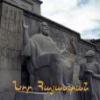QUOTE(Arpa @ Nov 1 2007, 02:44 PM)

Nor Hayastan is this what you're looking for?
http://www.geocities...an-Glossary.htmDoes that mean Ajarian cannot be revised and improved? Since those days the world has been evolving so fast that many hypothesis need not only yearly, monthly, weekly and even daily revisions. Even stupid me sometime spot inconsistencies and broad gerelaizations. I wish I had kept track of them. One of them tha I remember is "imanal", he totally dismisses the Arabic word "iman" faith/belief/trust, from which "amen/ամէն***/amin", "I believe, I trust".
On the ամ/am deal. The reason the Nikolai Marr even embarked on his ambitious (and career-wise, disastrously costly) Japhetian theory was precisely due to the strange fact that semitic and indo-european seem to have the same nostratic root language.
What was Marr's conclusion, since he no longer saw the point is separating languages into separate families under the Sprachbund assumption?
He decided that the so-called language families are merely developmental stratum due to the cultural setting each stratum had to adapt to.
Thus, any term that is a call for "fulfillment of a desire, yearly cycle, birth/death cycle, motherhood," and so on, anything to do with "Am" is prevalent in both IE and Semitic. "Faith, belief, trust," are mere offshoots of the same concept of "mother's wish, fulfillment of the motherly [life/death] cycle" and so on.
Am is mother.
Am,
An, Anna, Ani, all these are roots for mother. Ameak, the year, the completion of the
annual cycle (the latin root anno, same root)
"
Amin" was thought by Dumezil to mean "the desires of the moon," since "
am" or "
ama" is also a reference to the moon as a symbol of this motherly cycle.
Ar-
am, the very pairing of the oposites in one name, since mythology has played the shift in who dominates. Otto Ranck exploited Marr's thoughts and applied the same idea to Myths as to language; i.e. myths change as society changes, and so language changes, and all of its lecxical and semantic application to life and existence changes simultaenously.
This is not to say that Marr proved his theory to the hilt. He did not. (But, curiously enough, Ranck's thoughts caught on, and comparatve and developmental mythology is a respected idea). This is obviously not a one man venture. However, I am just pointing out one of the reasons that compelled him to feel this way and to jump on this theory.
The very name
Sem/Shem/Sim is Armenian in origin. To those who object to the ethnicity link, I say that it is at least Armenian
geographically and very possible ethnically. (Hey, accord to the well-known and not-so-well known myths, even Japanese myths, things began from our mountains.)
So, when J. Hawkes once said "Assyrian is partly rooted as a culture in the north, and the oldest cultural stratum in Assur is Hurri-Mittanian, or of the Armenian highlands." So it goes.



















